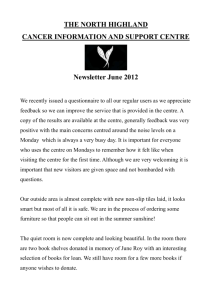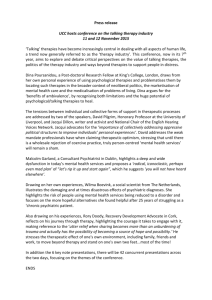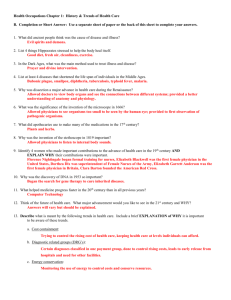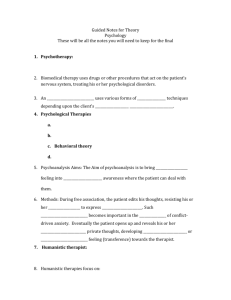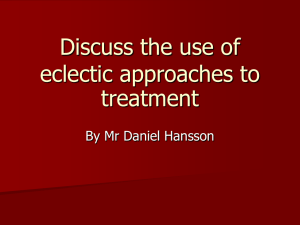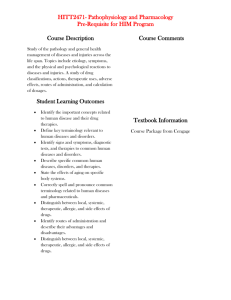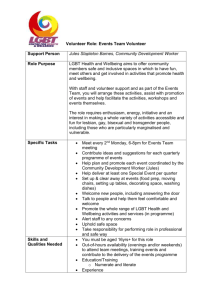Read Project Evaluation 2014 - Community Foundation for
advertisement
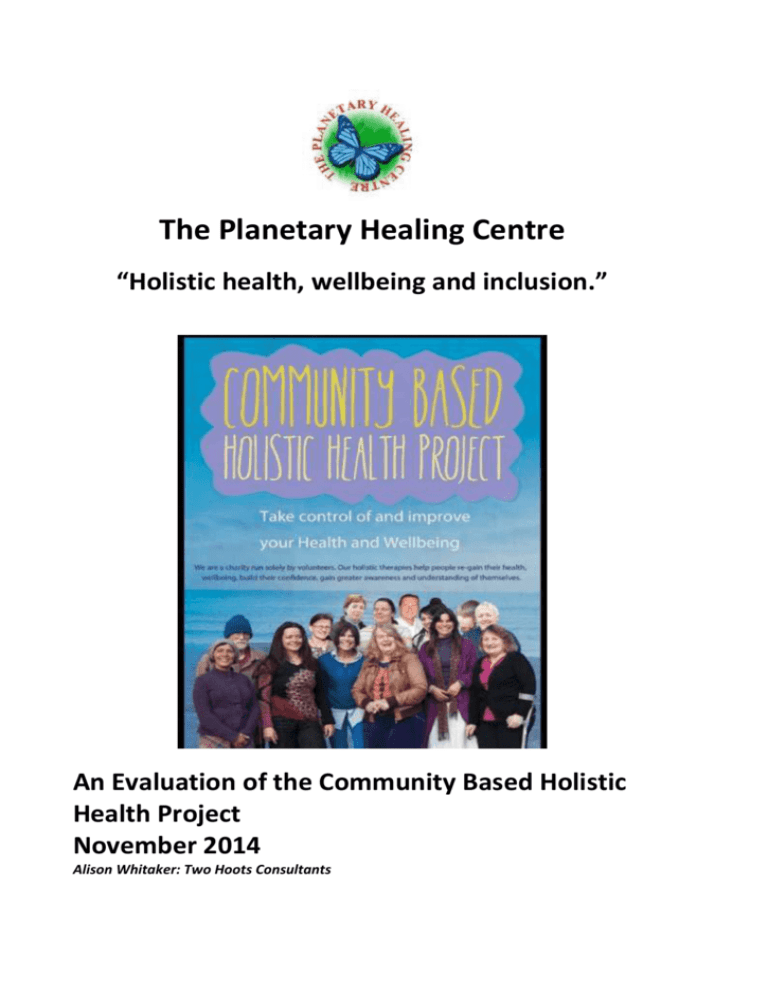
The Planetary Healing Centre “Holistic health, wellbeing and inclusion.” An Evaluation of the Community Based Holistic Health Project November 2014 Alison Whitaker: Two Hoots Consultants The Planetary Healing Centre is an Edinburgh based charity founded in 2003 and run solely by volunteers. Its website www.planetary-healing.org describes its Community Based Holistic Health Project as: “A deep expression of compassion for others and our living planet” The aim of the project is to offer holistic therapies help to reduce stress and create well being, to prevent illnesses and help people to get better quicker when they are unwell or lacking energy. The project has its basis in the belief that effective holistic approaches combined with orthodox medicine can enable individuals to progress and move towards a more positive health much quicker. The Holistic Health Project Mission Statement: “To help people to re-gain their health, wellbeing, build their confidence, gain greater awareness and understanding of themselves.” The project aims to: Help people regain control of their own health and well-being Complement the support orthodox medicine is giving to people with ill-health Endeavour to prevent people from developing mental health issues related to the lack of support, lack of belonging and isolation Provide volunteering opportunities that will offer our clients holistic support contributing to a stronger, more resilient and supportive community. 354 people are currently registered with the centre of whom 81 made appointments for therapies with 75 actually attending in the course of the year. The average number of attendances per person was 5 over the year although the maximum was 23 sessions. Additionally an average 30 people each week attended regular evening classes, workshops, open days, fundraising events and trainings as part of the Community Initiative. The majority of people accessing the project are those living on benefits, pensions and low income. This group face many challenges and disadvantages in comparison with more affluent members of society and are less likely to be able to access therapies which can 2 assist with managing their health and wellbeing. The direct influence of inequality and the accompanying stress on these groups’ health and wellbeing is widely recognised by The Scottish Government and NHS. “Poor health is not simply due to diet, smoking or other life style choices. We need to understand factors underlying poor health and health inequalities such as people's aspirations, sense of control and cultural factors. This is best understood as a 'sense of coherence', in which the external environment is perceived as comprehensible, manageable and worthwhile. Without this sense of coherence, people are likely to be subject to chronic stress and poor health as a result.”1 The Holistic Health Project is a project which offers a close match with the The Scottish Government's national Health and Wellbeing Outcomes 2 which set out high-level statements of what health and social care partners are attempting to achieve through integration and ultimately through the pursuit of quality improvement across health and social care. By offering a wide choice of accredited therapies to those on the lowest incomes The Community Based Holistic Health Project is very much in the spirit of these outcomes and particularly embodies the following: Outcome 1: People are able to look after and improve their own health and wellbeing and live in good health for longer. Outcome 5. Health and social care services contribute to reducing health inequalities. Background The Planetary Healing Centre was founded in October 2003 and in 2014 it has two main activities: The Community Based Holistic Health Centre based in a small shop with basement on Portobello High Street and the other is The Nature Connection Project which runs from a 20ft yurt in a rented woodlands near Balerno. The centre reduces overheads by trustees carrying out the bulk of administrative and financial tasks working from home. In the 12 months covered by this report (October 2013 -14) The Holistic Health Centre was open to the public on 42 weeks, Monday to Thursday 10am -3pm. In that period the project delivered 358 low cost sessions to 75 people on benefits or low income. A further 51 sessions were organised for which people failed to attend (14%). This non attendance figure is comparatively low for community health projects and to be expected when vulnerability of the clients and the challenges facing them attending sessions are taken into account. Therapies are offered for a suggested donation between £8 and £20 per session (the average actual donation is around £10). A comparable session elsewhere would cost around £45-100. When researching this report I discovered that several community health 1 2 Equally Well Review (2010a) Scottish Government http://www.scotland.gov.uk/Topics/Health/Policy/Adult-Health-SocialCare-Integration/Outcomes 3 projects had closed or had ceased to offer therapies in recent years and I could only find two lower cost clinics currently available elsewhere in Edinburgh and these cost £25 and £20 respectively, required evidence of certain benefits and offered fewer choices of therapies. The projects standard suggested donation for therapies is very low; however the project’s publicity makes it clear that for those at the greatest financial need therapies can be available entirely free of charge and around 10 clients each year are treated without charge. “If you cannot afford the smallest donation suggested, please talk to us. We really would like the project to be accessible to all who need it.” A menu of almost 30 complementary therapies was on offer in 2013-14 and some of the therapies delivered included: Massage, Indian Head Massage, Reiki, Shiatsu, Shamanic Healing, Stress Management, Transformational Breath work, , Cranio sacral therapy, Indian Head Massage, Hypnotherapy, Neuro-linguistic Programming, Reflexology, Confidence building, E.F.T., Acupressure massage etc. Finance The Charity had to raise approximately £25,738 in 2014 to run including building running costs, admin costs, core costs such as accountancy and insurance, volunteer expenses and training. The charity generates around half of its running costs through donations from the project, fundraising events and rental of space, the rest through grant income which at present comes from The Big Lottery Awards For All and Edinburgh Voluntary Organisations Trust. The figure given above does not reflect any direct charge for therapists services which were donated free of charge and are estimated as having an equivalent value of around £25,200 with an equivalent additional amount donated in terms of free management and coordinator services £25,540 and £9,300 from trustees/ fundraisers input makes up to a total of £60,040 equivalent. Finally the Holistic Health Project also benefits from donated premises worth £7,200 which takes the total in kind benefits to £67,240. The project is very heavily subsidised by volunteers and as such is very cost effective but with this comes the risk of relying too heavily on certain key individuals. The project carries some reserves representing a few months running costs but is not heavily insulated against major repairs or able to carry out significant improvements to premises such as installation of central heating. 4 Volunteers Volunteers by activity Trustees and Elders 29% Therapists 42% Coordinators 16% Nature Project13% The project could not run its services at such a low cost without a team of nearly 30 volunteers over the course of the year and since 2009 the Charity has maintained Investing in Volunteers accreditation. Volunteers carry out a wide range of tasks, from delivering therapies and training, office and admin roles, coordination and reception duties and humble but necessary cleaning and maintenance roles. All therapists have accredited qualifications and PVG checks are routinely carried out when joining the project. The project currently has a waiting list of therapists who wish to practice with the centre. Therapists can expect to be reimbursed for travel and subsistence costs and can access regular supervision, training and opportunities for continuous professional development. A snapshot of the volunteer team in 2014 would show around 12 Therapists attending fortnightly and 3-4 Coordinators attending one or more days per week with 2 volunteers carrying out multiple tasks on several days each week. There is also a team of therapists and helpers who come in for open days, fundraisers and events and another team who help with The Nature Connection Project. The Trustees and Elders meet monthly and take on health and safety, finance, fundraising and all other aspects of running the charity. Like the service users the volunteer team is predominantly female (around 84%). The volunteers are a very dedicated group and their passion for the project is undeniable with the average length of volunteering commitment well over 1 year and many volunteers having volunteered for several years or even 10 years. The core group have shouldered a great deal of the burdens of running the project in recent years and among them there is a broad consensus among them that they would prefer their efforts to be supported by a paid staff member acting as a volunteer coordinator and therapies centre manager. This is therefore one of the priorities for the project in the coming year. 5 100% of the service users I interviewed were aware that the project was run entirely by volunteers and many expressed their appreciation. “Absolutely fantastic, wonderful” “One of the wonderful things “ “They are superb!” Volunteers feedback and comments are further summarised in appendix a. Methodology The brief of this evaluation was to assess the effectiveness of the Community Based Holistic Health Project in achieving its aims and to take suggestions and feedback to ensure that it remains a project closely guided by its service users and volunteers. Quantitative and Qualitative information was collated including data from client registration forms and therapy appointment sheets. 26 Telephone interviews were carried out between 14 -27 November 2014 with a further 2 questionnaires returned by email. (See questionnaire appendix b) 17 service users (23%) were interviewed who had attended the project over the past 12 months varying between one and 23 sessions. All 5 current trustees were interviewed including Mark Halliday (Chairperson) and Claudia Goncalves (Treasurer and Manager) who are the projects founders and who continue to play a pivotal role. Claudia carries out the majority of the administrative and management work of the project and has at some point in the past 10 years carried out every role the project including cleaning. Additionally I interviewed 3 former trustees who have worked with the project since the beginning and continue in an advisory capacity as Elders. Of the volunteers contacted 3 had acted as coordinator/ receptionists of the therapies service. 9 were therapists offering treatments. 3 of the volunteers interviewed were also users of the therapies services in 2013-14. Who are the people being helped by the project? Holistic Health Project service users are adults living on a low income or are children from families on a low income. The project does not require formal evidence of benefits as part of the referral process and is available to working people on lower and part time incomes as well as retired people. As the approach of the project involves finding out about client’s personal situation there is little chance of people using the services who are not genuinely eligible. Likewise people are known and trusted by the project to make a donation for therapies at a level they can afford. People on higher incomes are signposted to make private appointments with individual therapists outwith the core project hours. Over the year the project was successful in attracting people from a wide range of communities with almost a quarter (22%) of those making appointments being drawn from non British and Asian/Asian British communities. Those attending across the board were predominately female (84%) perhaps also reflecting the largely female make up of the project’s volunteer team and therapist team. 6 service users by gender 70 60 50 40 Series1 30 20 10 0 female 84% male 16% service users by age 25 20 15 Series1 10 5 0 under 18 2% 18-30 7% 30-50 42% 50+ 49% Data re nationality, national origin, race and ethnic origin w here disclosed 70 60 50 40 Series1 30 20 10 0 White British or Irish 78% White Other 14% Asian/ Asian British 7% Other 1% 7 Address of service users EH15 Portobello and surrounding district EH7 Broughton to Willow brae Edinburgh and Lothian Out w ith Lothian EH15: Portobello, Bingham, Magdalen,Jewel, Niddrie, Brunstane, Willowbrae 24% EH7 Broughton, Restalrig, Meadowbank, Willowbrae 20% Edinburgh and Lothian other postcodes 51% Outside Lothian 5% How did you hear about the project? In general the commonest ways for people to find out about the project are through the recommendation of a friend or a recommendation through a meeting with one of the project’s volunteers. The other commonest way is by simply passing by Holistic Healing Project building which is on the main Portobello High Street. One person mentioned that the project is nearby to their local GP surgery and some link ups with this may be worth considering. Only two people mentioned the project’s website and one of those was pointed to it by her daughter who actually lives in Australia. No-one mentioned referral from any NHS route. No one mentioned seeing any flyers, leaflets or posters this is perhaps because the project was re-vamping its leaflet in 2014 and new leaflet only came out in the autumn. Website 13% Passed by the shop in Portobello 40% Met one of centres volunteers 13% Recommendation of a friend 33% 8 When you first came in what aspects of your life did you feel the holistic health project might help you with? Reason for attending project sleep issues 15% stress /anxiety 36% mental health condition 21% physical illness or disability 62% Carer Responsibilities 10% Bereavement 5% Trauma 2% addiction issues 2% other 7% Many people gave multiple reasons for coming to the project e.g. physical illness and stress, or carers responsibilities and sleepless nights. Over and above these primary reasons a lot of people interviewed spoke about proactively seeking to improve their own health and looking to improving their general wellbeing and sense of balance. Some also mentioned taking time to consider spiritual questions. “I came in for many reasons: mind and body…general wellness. I called in because I wanted to find out more about alternative therapies” “I was going through personal problems. I was looking for help to heal myself without going to the doctor. I didn’t want to take anti-depressants” Mostly depression, I was off work with stress and depression.” “ I was searching for spirituality and healing” “I suffered a lot of back pain and someone said shiatsu might help.” I was suffering stress and a pain in my neck and shoulders. I was hoping to ease that.” I was quite lost. In bad shape mentally and physically...completely and utterly lost. No real grounding, spiritually, physically etc. I am getting there slowly.” 9 How would you describe your first visit to the project? Everyone who was interviewed gave a positive account of first impressions of the project staff with the only slight negative comments regarding the difficulties in reaching the basement rooms and lack of comfy seating and one unfortunate incident when someone had accidently entered the therapy room not realising it was in use. “Very friendly and informative. I set up an arrangement with a good counsellor. Tessa (coordinator / trustee) was very helpful, well informed, sympathetic- she guided me to what I might need” “A Brilliant Experience” “Reception Amazing” “Great, really friendly, open , inclusive and down to earth” “Really Good- they were so friendly and helpful. I felt very at ease straight away” “I found it very calming, very relaxing and very welcoming. It felt like a safe space you could trust” How would you rate the therapies you took part in? Service user rating of therapy sessions excellent 81% good 13% so-so 6% poor Excellent 81% Good or Very Good 13% So So 6% Poor 0% Have any lasting differences taken place in relation to your health? 79% of people interviewed reported lasting improvements to aspects of their health and wellbeing subsequent to attending therapies with the project. Many reported multiple benefits across a wide range of issues. 10 Long term changes to health 60 50 40 30 Series1 20 10 0 Mental Health 29% Stress 50% Sleep 14% Physical Health 22% Healthier Pain Other 7% lifestyle Relief 7% 7% “I am generally calmer and it helped a lot. “ “My shoulder pain is reduced. It is a long term improvement. The treatment has enabled me to continue doing yoga and keeping fit.” “Helped the stress in my neck and I sleep better after a massage.” “I’m much more positive, I look at things slightly differently…less worry. It really helped me very much.” “My tension was reduced by massage and my anxiety issues ...hypnotherapy made a difference.” “It helped with my anxiety issues and slight depression. It cleared my mind. I have more energy, a lot less sleepless nights. It’s been a brilliant help.” “I have more awareness of how the body works and changing attitude towards life. I am now practicing mindfulness and breathing. The pain relief needs me to keep having the therapies though.” The remaining 22% were not able to identify specific lasting changes to their health directly attributable to attending the therapies. Some had not been able to attend as many sessions as they would have wished to. This entire group remained enthusiastic or at least considering the idea of returning to the project in the future. “My mobility deteriorated, unfortunately and I couldn’t manage the stairs.” “I didn’t attend long enough. It was difficult to get an appointment, very few slots and I like to be able to be seen without a delay. “I have to change myself but it did put me on a path”. 11 Has your time with the project made a positive impact on any other aspects of your life? 86% reported a wide and diverse range of positive changes in their lives subsequent to attending the project. “I feel better in myself and it has a knock on effect on every area” “I benefitted from meeting people with similar ideas” “It helped me to perform better at work” “It helped me volunteer and be positive” “It helped me care for my 2 children who are both on the autistic spectrum” “keeping a job” “It helped lift me up for a while after treatment.” “It had a positive aspect on my relationships” “I became more trusting again and more open” Positive Im pacts on Life Improved relationships 7% Met new people 7% Volunteering 7% Employment 14% Carer Responsibilities 7% Learning 7% Improved all aspects 7% Other Improvements 36% Would you return to the project again in the future? Yes 93% Maybe 7% No 0% People were universally keen to come back and only one person interviewed was put off by stairs down to treatment room. A couple of people were put off by the possible length of 12 time to wait for appointments. One respondent felt she would not come back for a while because she “didn’t want to feel she was being greedy” Looking forward: Recommendations and suggestions by service users and volunteers 100% of service users interviewed would recommend the project to other people looking to find therapies. Many said they had already recommended it to friends and family. Service users had lots of suggestions for potential additional therapies (see below) whilst several respondents reflected that there was a lot on offer and could not suggest any more. Hypnotherapy Acupuncture Back Pain Clinic Physiotherapy for injuries Nutrition Naturopathy Massage Womens group where women can gather for healing Outreach events in the community and with other agencies Evening and weekend therapies sessions If you could suggest one improvement what would it be? If you could suggest one change.... No improvements needed 28% Better venue/ heating 28% Evening/ Weekend appts14% Shorter waiting times 43% More money for project 7% Awareness raising among NHS 7% Better communication 7% Raise profile in community 7% The commonest improvement suggested was a shortening of waiting times and the comment about the need for more money was also suggested as a way of providing more 13 therapists and reducing the wait for a service. Other respondents wished the project could open in the evening or at the weekend. “More money to allow more access to therapists and more appointments. They are booked up really quick. There is quite a wait for appointments.” Almost as many people however indicated that no improvements were needed and they just wanted to see more of the same. “For me it was totally fine. Everything done by the book.” The project’s building was a focus for some respondents for being too cold at times, a bit small and having stairs which were a barrier for anyone with mobility issues. “Could they afford central heating?” Other suggested changes focussed on raising the profile of the centre in the community and by raising awareness within the NHS. “Bring what is there to the community with more confidence.” Send volunteers to other, traditional NHS services...what the centre does has real value – equally valid as medical centres. “Get the service more out there…more promotion. Even people I speak to in the area don’t know about it. “ “The shop doesn’t stand out enough. It doesn’t grab your attention”. “A lot of the time the shop is closed. Put opening times on the door.” Summary of Findings: In general service users found the project very satisfactory with 94% rating the therapies good or excellent. The users also highlighted what a warm and welcoming experience they had from volunteers from the moment of joining the project. Most could identify short, medium and long term benefits they had experienced since joining the project both in terms of their health and in other aspects of their lives such as work, relationship and volunteering. Nonetheless all felt that they would benefit from being able to come back to the project in the future and some felt they might need further treatments to maintain some of the gains. Given that 100% of users keep wanting to come back for more there is a risk emerging that the therapies on offer are spread more and more thinly as the project continues with time being rationed between new people coming along and returners. This may be reflected in the other points raised by service users about waiting times for appointments and difficulties seeing particular therapists. There is a strong and ongoing demand for the therapies with people wanting more days and hours to be on offer. 14 Recommendation 1: Trustees look at the balance between therapies being offered to new service users and those being offered to long term service users. Perhaps giving new users some ring fenced appointments. Recommendation 2: The project might want to look in the medium term at increasing the number of therapy slots available and days/ times to accommodate returners whilst offering a service to new people. Plan for growth in numbers that is likely to arise from publicity initiatives and build capacity within the organisation to accommodate steady increase in demand. For the project to grow sustainably to accommodate additional therapy slots it is likely to require grant funding for a paid manager who can also act as a volunteers co-ordinator and project coordinator. This would have the additional advantage of reducing the pressure on the core volunteer team. The project might wish to approach the NHS e.g. Edinburgh and Lothian Health Foundation in relation to this. Recommendation 3: Service users expressed desire to see the project raise its profile within the community, with other groups and with the wider NHS health providers. Service users feel very positive towards what the Holistic Health Project offers and they would like to see it made available more widely. Many were particularly keen on the way the project created opportunities for poorer people to have access to the means to take control over their health. The project might wish to identify local partners and other agencies in the city to work together with to reach those on low incomes who are at most need of their services. Given that a significant number of service users people from Portobello and North East Edinburgh it may be useful to approach Neighbourhood Partnerships. Likewise planning/fundraising should reflect the high number of older people using the services and the diverse range of ethnic backgrounds. E.g. leaflets could be translated into multiple languages. The project might also want to consider approaches which will increase the proportion of men using the services e.g. different leaflet, more male therapists, dad and baby group. Recommendation 4 The service users appreciated that the project is run on a very tight budget however for some a warmer and more accessible space would be a significant improvement. The Project should consider launching an appeal to buy a building, perhaps the one they are currently in or perhaps a larger more accessible building. This would enable them to have greater security and to convert it exactly to the needs of the therapies. The project should also attempt to increase the level of reserves in the bank to allow for repairs and high winter bills etc. Crowd-sourcing, a public appeal or a community share issue might be worth considering for this. 15 And finally………….. In their own words service users describe the Holistic Health Project. “On the whole it’s been very good for me. A very good thing to have in the community. I like that you can pay what you can afford. A unique service. It’s wonderful “ “A brilliant project. It offers a lot of good therapies that people at the lower end of the financial scale can access as well” “It’s a wonderful place to go for natural health. It’s affordable, so much on offer and I am so pleased it is there.” “An amazing collection of people who are gifted at what they do. The practitioners are very gifted. I felt really welcomed and I’ll come back again.” “A way of benefitting your life socially, mentally, physically. so you can lead a fuller life” “A very positive experience, solely focussed on your health and wellbeing and making you into a better person as well” “It’s helped people at the end who don’t know who to turn to. It’s help everyone should have. It includes body, mind and soul and takes them as one.” “It’s a very friendly place and they are trying to help. They might not cater for everyone but I’d say they do their best” “ A low cost therapeutic centre” “A very down to earth, exclusive, warm, friendly (place)…It’s a great thing to do- amazing for people like me who cant afford £50 for a treatment” 16 “It’s a lovely healing, calming place. You will be welcomed and valued. A really good place to go. The therapists are excellent. You feel safe when you come.” “This service provides the opportunity to be included again. It includes the parts that need support.” “A very important training place. A safe place for recently trained therapists to start working. Really wonderful.” 17 Appendix A The Volunteers: The Heart of the Planetary Healing Centre Holistic Health Project “We have managed for years thanks to the good will and hearts of our volunteers. Without our volunteers none of this would be possible. “ Claudia Goncalves project founder and trustee. Why did you want to volunteer with the project and did volunteering meet your expectations? “I chose to volunteer to help others in the best way I could, by offering my experience and knowledge for my community and people. I was astonished by the amount of people who came and who remain part of it.” “Mark and I have seen the need in our community to help people who were really struggling with their health and wellbeing and could not afford to pay full price of therapies. Compassion for those struggling and without money took us to start help on a small scale along side our private practice at the time. So as Shamanic practitioners we sometimes gave sessions for people for less money and occasionally free. More and more people were coming and we could not do it all by ourselves, so we decided to start the project and have others helping. We first started one day a week, then 2, then 3, then 4 days a week. More and more volunteers came wanting to help. “ “I had some therapies myself and I wanted to give back. I wanted to gain experience with some of the therapies I was working with. Volunteering met my expectations because of the clients I have seen and the outcomes those clients have achieved and the benefits to me as a therapist” “I was ill of 10 years and had 1 or 2 years when I was very dependent and not able to work. I wanted to give some energy back afterwards for people who can’t afford treatment. It was a nice experience, very welcoming, and the bookings are organised well. Clients are very different from my private clients, more fragile, vulnerable, urgent and desperate cases…Claudia is really supportive. I was really happy with the guidance I got. Anyone could volunteer but it is quite challenging for very, very new therapists” 18 “I really love the space and I love the people who work there…a lot of integrity. A beautiful space and I like the energy of Portobello. Felt it was a good thing to do. I hoped I was going to grow and offer something. The surprise is how much I have received. I am working with very lovely people on all levels” “I wanted to help. I do therapy and I wanted to help folk on a low income. I feel I’ve learnt a lot from it and I enjoy doing it.” “I liked the way Mark and Claudia worked “from the heart” not about money. “ “Within a few months of using therapies I felt very comfortable at the project. I really, really admire the project and its unique way of helping people: something powerful and important. I hoped I would enjoy volunteering. It’s like having a spiritual degree: exhausting but so rewarding.” “I am blind and my grandson told me about the shop. He said he’d seen a shop I’d like that had crystals in the window. I could have passed loads of times otherwise. I came in and bought some crystals, attended one of the workshops with Mark and we became friends and I volunteered. Volunteering at the centre opened up another group for me and shown people that I am a normal person. Having disabled people in the shop is good.” “I wanted to assist in any way I could. I felt a part of it. “I have a medical background as a ward sister and had worked around the world. I teach holistic therapies, Reiki and Scottish healing traditions. Volunteering has been life enhancing to me.” “I’ve always loved to help people. I enjoy it. It comes naturally. The people were lovely. I keep in touch with some of them. I love Mark and Claudia, lovely people, beautiful.” Has Volunteering made an impact on other areas of your life? Benefits to volunteers employment 29% volunteering 21% education/training 35% social life 14% all areas of life 7% bereavement 7% other 14% 19 Many of the volunteers could point to benefits of volunteering making an impact elsewhere in their lives e.g. in the area of work: “It helped me by building up my experience of therapies I offer.” “It is wonderful to be able to practice certain therapies regularly” “I have moved into working with people with mental health issues.” “ Volunteering brought me back into the world and I trained as a therapist” “I met the most interesting people. I don’t think I could really live without it” “The project helped me immensely when my husband died….it did wonders. Other agencies didn’t help. I am 71 and retired and I am doing my masters in Reiki. ” “I discovered a gift I didn’t know I had: The gift of leadership. Volunteering in our charity also helped me to build my confidence in many areas. Because English is not my first language, been a volunteer also helped me to improve my writing skills big time. “ “When you grow in one area it flows through everything you do.” Training sessions volunteers would wish to attend: All therapies Shamanic Healing Mindfulness Training in working with specific client groups First Aid Training Mental Health Awareness and awareness of conditions e.g. schizophrenia Working with vulnerable people Introduction to counselling Regular group Open Forum meetings to share info, skills etc If you could change one thing? The volunteers comments provide another take on the points which were highlighted in the interviews with service users. Their conclusions are strikingly similar suggesting that there is a high degree of consensus regarding the challenges and the likely solutions. 20 “If we could have a full time paid manager, we could bring in more volunteer therapists and help more people.” “If we had more money we could do more. There is next to no money to pay therapists travel and lunches. We run on a shoestring. I would like to see us do more outreach.” “Some i.t. and the internet would make it more accessible and bring it into the 21 st century” “Reach more people” “I would love it if the rooms were warmer. For me it’s challenging, the floor is ice cold. Rooms better insulated…and bigger” “expand the building” “We are on a knife edge of economy all the time. We don’t let it worry us unduly but I remember when we had to close one Winter because we couldn’t afford enough heating.” “I expected volunteers to get together as a group. I wanted to feel more involved. I think that because there is a lack of funding and no paid staff it is difficult to pull it all together.” “More funding to allow more hours and more therapists in. Ideally we’d have a bigger building and be expanding with a coordinator on site most days working in partnership with Claudia.” “We need to be fitting into the broader community: not thinking them/us. Not sure how it is done. A poster would be useful looking at therapies and our ethos. The centre has a lot to give…a viable product…needs to be accepted and integrated more in the system.” “Need to get more into the NHS and funding related to this. Need to raise the profile in Portobello and Balerno as local people haven’t heard of us.” “Sometimes hard to get volunteers for reception. Could also do with standby therapists to cover for sickness etc.” “I would like to see the project offer services for free to certain groups. Perhaps we could also target men. Need to have more meetings so that everyone knows what’s going on..especially volunteers. 21


